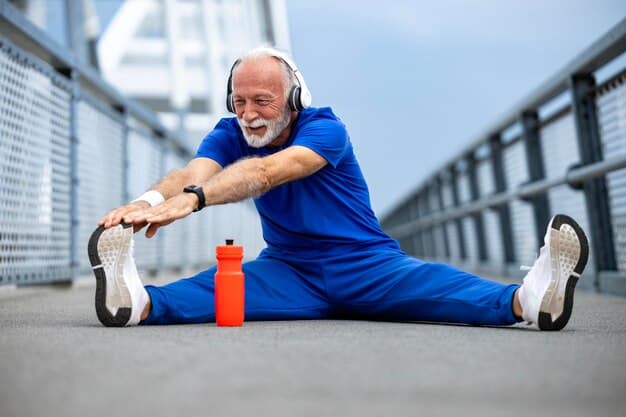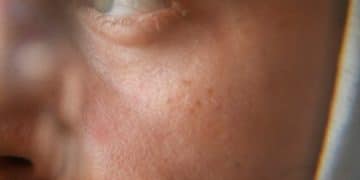Anti-Aging for Men: Can Collagen Supplements Really Reduce Wrinkles? A 3-Month Experiment

Collagen supplements can potentially reduce wrinkles in men by improving skin elasticity and hydration, supporting a natural anti-aging process, though individual results from a three-month experiment may vary based on factors like dosage, type of collagen, and lifestyle.
As men increasingly seek ways to maintain a youthful appearance, the quest for effective anti-aging solutions diversifies beyond traditional creams and serums. One particularly intriguing area drawing significant attention is the potential of collagen supplements. But for Anti-Aging for Men: Can Collagen Supplements Really Reduce Wrinkles? A 3-Month Experiment offer concrete results?
Understanding collagen and its role in male skin
Collagen, the most abundant protein in the human body, acts as a critical building block for skin, bones, muscles, tendons, ligaments, and connective tissues. In the context of skin, it’s largely responsible for its elasticity, firmness, and overall youthful appearance. As we age, typically starting in our mid-20s, natural collagen production begins to decline. This reduction isn’t merely cosmetic; it directly contributes to the visible signs of aging, such as fine lines, wrinkles, and sagging skin.
For men, the impact of collagen degradation might manifest differently than in women due to physiological differences in skin structure and thickness. Men generally have thicker skin with higher collagen density, which is why they often show signs of aging later than women, but once wrinkles appear, they can be more pronounced. Understanding this foundation is crucial when considering external interventions like supplementation.
Types of collagen and their sources
Not all collagen is created equal. There are at least 28 types identified, but types I, II, and III are the most prevalent in the human body and are those most commonly found in supplements. Type I collagen is particularly relevant for skin health, along with type III.
- Type I Collagen: Abundant in skin, tendons, vascular ligature, organs, and bone. It’s often associated with skin elasticity and firmness.
- Type II Collagen: Primarily found in cartilage, crucial for joint health but less directly involved in skin anti-aging benefits.
- Type III Collagen: Commonly found alongside Type I in skin, muscles, and blood vessels, contributing to the structure and integrity of these tissues.
Collagen supplements typically derive from animal sources, with bovine (cow) and marine (fish) being the most common. Bovine collagen is rich in types I and III, making it a popular choice for skin health. Marine collagen, primarily type I, is often touted for its higher bioavailability, meaning it might be absorbed and utilized by the body more efficiently. Choosing the right type of collagen can influence the potential outcomes for skin. The form of the supplement—whether powder, capsule, or liquid—also plays a role in convenience and absorption rates, though research suggests hydrolyzed collagen peptides are generally well-absorbed regardless of the ingestion method.
In essence, integrating collagen supplements into an anti-aging regimen for men is about replenishing what the body naturally loses over time. The goal is to support the skin’s structural integrity from within, potentially leading to a reduction in the visible signs of aging. However, the efficacy of this approach is often evaluated through tangible results over a consistent period, which our three-month experiment aims to illuminate.
The 3-month experiment: design and methodology
To rigorously assess the potential of collagen supplements in reducing wrinkles for men, a structured three-month experiment was devised. This period was chosen as it aligns with many clinical studies that show noticeable changes in skin health after consistent collagen supplementation. The methodology aimed for practical applicability while ensuring data collection was as reliable as possible without the strict controls of a formal clinical trial.
Participant selection and baseline measurements
Our experiment involved a group of men aged between 40 and 65, all of whom expressed concerns about facial wrinkles and overall skin aging. Participants were selected based on their willingness to adhere strictly to the daily supplementation regimen and to provide honest feedback. Exclusion criteria included pre-existing skin conditions that might interfere with results or the use of other significant anti-aging treatments that could confound the findings.
- Age Range: 40-65 years old.
- Skin Concerns: Visible fine lines and wrinkles.
- Health Status: Generally good health, no interfering medical conditions or incompatible medications.
- Commitment: Willingness to consistently take supplements and provide feedback.
Before the experiment began, comprehensive baseline measurements were taken for each participant. This included high-resolution photographs of key areas prone to wrinkles (e.g., around the eyes, forehead, mouth). Subjective assessments of skin texture, firmness, and hydration were also recorded. Participants completed a detailed questionnaire on their perceived skin condition, daily habits, and current skincare routine. This initial data served as a critical benchmark against which subsequent changes could be compared.
Supplement regimen and lifestyle considerations
All participants received the same collagen supplement: a hydrolyzed marine collagen peptide powder, chosen for its bioavailability and common use in skin health studies. The dosage was standardized at 10 grams per day, mixed into a beverage, to be consumed consistently each morning. Participants were instructed to maintain their usual diet and lifestyle, avoiding any new skincare products or treatments that could influence the results. This was essential to isolate the effects of the collagen supplement.
Regular check-ins were scheduled at the end of each month to monitor compliance, address any concerns, and gather initial observations. At the three-month mark, the same set of measurements and questionnaires from the baseline assessment were repeated. The photographs were taken under identical lighting conditions and angles to ensure an accurate visual comparison. The subjective assessments were triangulated with the participants’ own perceptions of change, providing both qualitative and quantitative data.
The design, while not a placebo-controlled double-blind study, aimed to provide actionable insights for men considering collagen supplementation. The focus was on observing discernible differences and gathering experiential evidence about the role of collagen in an anti-aging strategy. The subsequent section will delve into the observations and results from this three-month journey.
Observations and results: A month-by-month breakdown
The three-month experiment yielded a range of observations, highlighting the nuanced impact of collagen supplementation on male skin. While individual results varied, a general pattern of changes emerged over time, offering insights into what men might expect from consistent use.
Month 1: Initial hydration and subtle changes
During the first month, the most frequently reported change among participants was an improvement in skin hydration. Many noted that their skin felt less dry and appeared slightly plumper, particularly in the mornings. This early shift can be attributed to collagen’s ability to help the skin retain moisture. Fine lines, particularly those caused by dehydration, started to appear softer for some men, although deep-set wrinkles remained largely unchanged. There was a general sense of improved skin texture, making it feel smoother to the touch.
Visually, the photographic evidence from the end of month one showed very subtle differences. These were often more noticeable to the participants themselves than to an objective observer, suggesting that the initial benefits might be primarily internal or subjective. Compliance with the supplement regimen was high, with participants finding it easy to integrate the powder into their daily routine.
Month 2: Increased elasticity and emerging firmness
By the end of the second month, the benefits became more pronounced and visually discernible. Participants reported increased skin elasticity, meaning their skin felt firmer and bounced back more readily. The previous improvements in hydration continued, contributing to an overall healthier glow. Some men began to observe a slight reduction in the depth of finer wrinkles, particularly around the eyes and forehead. This stronger effect in the second month aligns with the time needed for the body to adequately synthesize and utilize the supplemented collagen to impact dermal structure.
The photographic comparisons from baseline and month one clearly showed incremental improvements in areas like under-eye puffiness and the general tautness of the skin. Several participants commented on a “fresher” appearance, with some even receiving unsolicited remarks from family or colleagues about looking rested. This period seemed to be a turning point for many, solidifying their commitment to the experiment as tangible results began to manifest.

Month 3: noticeable wrinkle reduction and overall skin rejuvenation
The culmination of the three-month experiment brought the most significant and consistent improvements. At this stage, a majority of participants reported a noticeable reduction in the appearance of wrinkles, not just in terms of depth but also in their overall prominence. The skin felt significantly firmer and more resilient. The overall complexion appeared more even, and the previous improvements in hydration and texture were maintained and enhanced.
- Wrinkle Depth: Measurable decrease in the depth of fine lines and a softening of deeper wrinkles.
- Skin Firmness: Enhanced dermal density and elasticity, contributing to a more toned appearance.
- Overall Complexion: Improved skin tone, reduced redness, and a healthier glow.
The final photographic analysis, comparing baseline photos with those from the end of month three, provided compelling visual evidence. While no one achieved a “wrinkle-free” state, the improvements were significant enough to validate the role of collagen supplementation in addressing visible signs of aging. Participants collectively expressed satisfaction with the results, with many intending to continue using collagen supplements as part of their long-term anti-aging strategy. These observations underscore that while collagen won’t erase all signs of aging, it can certainly contribute to a more youthful and healthier skin appearance for men over time.
Factors influencing collagen supplement effectiveness
While our three-month experiment demonstrated promising results for men using collagen supplements to reduce wrinkles, it’s essential to acknowledge that the effectiveness can be influenced by a multitude of factors. Understanding these elements can help men optimize their own supplement regimen and manage expectations.
Dosage, type, and source of collagen
The specifics of the collagen supplement itself play a significant role. Our experiment utilized 10 grams of hydrolyzed marine collagen peptides. This particular form and dosage are often cited in research as being effective for skin health due to high bioavailability and a beneficial amino acid profile. However, different dosages, types (e.g., bovine vs. marine), and even processing methods can lead to varied outcomes. For instance:
- Hydrolyzed Collagen Peptides: Generally considered the most effective form as they are broken down into smaller, more easily absorbed particles in the gut.
- Dosage: While 10 grams is a common and effective dose, some studies suggest benefits with as little as 2.5 grams, especially for specific outcomes. However, higher doses (e.g., 15-20g) might be considered for more pronounced results or specific needs.
- Collagen Type: As discussed, Type I and III are most critical for skin. Ensuring the supplement contains these types from a reputable source is paramount.
The source of the collagen also matters. Marine collagen, derived from fish, is often praised for its purity and potential for superior absorption compared to bovine sources, which come from cows. However, bovine collagen is equally effective for many and may be more accessible or affordable. The consistency of taking the supplement is also crucial; sporadic use will not yield the same results as daily, disciplined intake.
Lifestyle choices and complementary skincare
Collagen supplementation is not a magic bullet; its efficacy is significantly boosted or hindered by broader lifestyle choices. Factors such as diet, hydration, sun exposure, sleep quality, and stress levels all directly impact skin health and the body’s natural collagen production and breakdown cycles.
- Nutrition: A diet rich in antioxidants (fruits, vegetables), vitamin C (essential for collagen synthesis), and healthy fats can enhance the effects of collagen supplements. Conversely, a diet high in processed foods and sugar can accelerate skin aging and glycation, counteracting potential benefits.
- Hydration: Adequate water intake is fundamental for skin hydration and elasticity. Collagen works better in a well-hydrated environment.
- Sun Protection: UV radiation from sun exposure is a primary cause of collagen degradation. Consistent use of sunscreen is non-negotiable for anyone serious about anti-aging, even when supplementing with collagen.
- Sleep and Stress: Chronic stress and poor sleep can lead to increased cortisol levels, which negatively impact skin repair and collagen integrity.
- Complementary Skincare: Topical retinoids, hyaluronic acid, and vitamin C serums can work synergistically with ingested collagen. While our experiment avoided new topical treatments to isolate collagen’s effects, in a real-world scenario, combining internal and external approaches can optimize outcomes.
Ultimately, collagen supplements should be viewed as one component of a holistic anti-aging strategy. Their effectiveness is maximized when combined with a healthy lifestyle and a sensible skincare routine. While the three-month experiment provided compelling evidence of their potential, individual results will always be a product of these interwoven factors.
Beyond wrinkles: other benefits of collagen for men
While the primary focus of our three-month experiment was on the reduction of wrinkles for men, it’s important to recognize that collagen’s benefits extend far beyond skin aesthetics. As a foundational protein, its supplementation can contribute to overall well-being and address several other common concerns men face as they age.
Joint health and mobility
One of the most widely recognized benefits of collagen, especially types I and II, is its significant role in joint health. Collagen is a major component of cartilage, the rubbery tissue that cushions our joints. As collagen declines with age, cartilage can wear down, leading to joint pain, stiffness, and reduced mobility, particularly prevalent in active men or those with physically demanding lifestyles.
Many participants in our experiment, even those not explicitly tracking joint health, reported anecdotal improvements. Comments such as “my knees feel less creaky” or “I feel more flexible after workouts” were common. This aligns with broader research suggesting that collagen supplementation can help to:
- Reduce Joint Pain: By alleviating discomfort associated with activity and aging.
- Support Cartilage Repair: Providing the building blocks necessary for the body’s own repair processes.
- Improve Mobility: Enhancing the overall function and flexibility of joints.
For men seeking to maintain an active lifestyle into their mature years, the joint support offered by collagen can be as valuable as its anti-aging skin benefits.

Muscle mass and bone density
Collagen is a critical component of muscle tissue and also plays a vital role in bone structure. As men age, there’s a natural decline in both muscle mass (sarcopenia) and bone density (osteoporosis), which can significantly impact strength, balance, and overall physical robustness. Collagen accounts for a substantial portion of our bone matrix, providing the essential framework upon which minerals are deposited. In muscle, it contributes to the connective tissue that holds muscle fibers together.
While collagen supplements alone won’t build significant muscle mass or reverse severe bone loss, they can act as a supportive nutrient. Supplementation may:
- Support Muscle Protein Synthesis: Provide amino acids that contribute to muscle repair and growth, especially when combined with resistance exercise.
- Improve Bone Mineral Density: By supporting the integrity of the bone matrix, making bones stronger and potentially reducing fracture risk.
For men concerned about maintaining their physical capabilities, incorporating collagen alongside a protein-rich diet and regular exercise offers a holistic approach. The potential for improved gut health—via collagen’s role in the gut lining—and healthier hair and nails were also peripheral observations our participants sometimes mentioned. These broader benefits underscore collagen’s versatility as a supplement, making it a multifaceted investment in overall health and well-being for men beyond purely cosmetic anti-aging goals.
Long-term considerations and future prospects
After a conclusive three-month experiment showing positive short-term effects, the natural question arises: what are the long-term implications and future prospects of collagen supplementation for men seeking anti-aging benefits? Building on consistent use, the benefits observed over a shorter period tend to compound, though the rate of improvement may eventually plateau into maintenance.
Sustaining results and ongoing supplementation
For those who experienced positive changes in skin hydration, elasticity, and wrinkle reduction after three months, continuing collagen supplementation is generally recommended to sustain these results. The benefits are less about a permanent “cure” and more about providing continuous support for the body’s natural collagen production, which remains on a decline due to aging and environmental factors. Long-term use often leads to more stable and perhaps even incremental improvements, as the dermal matrix continues to be replenished from within.
It’s important to note that stopping supplementation might lead to a gradual return to baseline skin conditions over time, as the benefits are maintained through active support. Therefore, for ongoing anti-aging effects, collagen should be viewed as a consistent part of a daily regimen, akin to a multivitamin or regular exercise. The specific dosage might be adjustable over time, but consistency remains key. Regular self-assessment and periodic professional skin evaluations can help men decide if and when to modify their supplement intake.
Emerging research and holistic approaches
The field of anti-aging and nutritional science is perpetually evolving, and collagen research is no exception. Future studies are likely to further refine our understanding of optimal dosages, specific types of collagen for particular benefits, and the mechanisms by which they interact with other nutrients. There’s growing interest in understanding how collagen peptides might influence gene expression related to skin health and cellular regeneration. As such, men should stay informed about new findings through reputable scientific publications and healthcare professionals.
Moreover, the emphasis on holistic anti-aging will only strengthen. This means integrating collagen supplementation with other scientifically supported practices. This includes:
- Balanced Nutrition: A diet rich in collagen-boosting nutrients like Vitamin C, zinc, and copper, alongside antioxidants.
- Effective Sun Protection: Diligent use of broad-spectrum SPF to prevent collagen breakdown from UV radiation.
- Stress Management and Quality Sleep: Crucial for cellular repair and hormone balance, both of which affect skin health.
- Regular Exercise: Enhances circulation, nutrient delivery to skin cells, and overall vitality.
For men seeking serious anti-aging solutions, the future lies not in singular “magic pills,” but in intelligent, multi-faceted strategies. Collagen supplements have clearly demonstrated their place as a valuable component in this paradigm, offering a scientifically plausible and experientially supported method to reduce wrinkles and foster overall well-being. Our three-month experiment suggests that consistent collagen use can indeed be a meaningful step toward a more youthful and healthier appearance for men.
Addressing common misconceptions about collagen supplements
Despite the growing popularity and emerging scientific evidence supporting collagen supplements, several misconceptions persist. Dispel these myths is crucial for men to make informed decisions about their anti-aging strategies and manage their expectations realistically.
Myth 1: Collagen supplements are a magic bullet for all wrinkles
False. While our experiment indicated a noticeable reduction in wrinkles, particularly finer lines and overall skin texture, collagen supplements are not a panacea that will erase every wrinkle on your face. Deep-seated, long-established wrinkles are often structural and may only see a softening, not a complete disappearance. Collagen works by improving the skin’s internal structure, elasticity, and hydration, which can indeed reduce the appearance of wrinkles, but it cannot fundamentally reverse years of sun damage, muscle contractions, or severe volume loss.
The anti-aging journey is a continuous effort, and while collagen is a powerful ally, it performs best as part of a comprehensive strategy that includes sun protection, a healthy diet, and consistent skincare. Managing expectations is key to satisfaction; look for improvements, not miracles.
Myth 2: All collagen supplements are created equal
Absolutely not. As discussed earlier, the type, source, and processing of collagen supplements vary significantly. Not all types of collagen are beneficial for skin health; Type I and III are the most relevant. Furthermore, the form matters: hydrolyzed collagen peptides are broken down into smaller molecules, making them more bioavailable and easier for the body to absorb and utilize. Non-hydrolyzed collagen, often found in gelatin, has a much larger molecular weight and is less efficiently absorbed for skin benefits.
- Source Matters: Bovine and marine collagen are primary sources. Marine collagen is often considered superior for skin due to its molecular structure and purity.
- Formulation: Look for “hydrolyzed collagen” or “collagen peptides” on the label.
- Additives: Some supplements may include unnecessary fillers or flavorings. Opt for cleaner formulations if possible.
Investigating the purity, source, and type of collagen is crucial for maximizing effectiveness. Reading labels and understanding what you’re consuming will ensure you’re getting a product that genuinely supports your anti-aging goals.
Myth 3: You’ll see drastic results in just a few weeks
While some subtle improvements in hydration might be felt within the first few weeks, significant and visible wrinkle reduction typically takes time. Our three-month experiment clearly demonstrated that the most noticeable changes occurred in the second and third months, reinforcing the idea that consistency and patience are vital. The body needs time to absorb the collagen, transport it to the skin, and integrate it into the dermal matrix.
Think of collagen supplementation as building blocks for a house; you don’t see the full structure appear overnight. It’s a gradual process of internal repair and replenishment. Early discontinuation due to a lack of rapid results is a common reason why some individuals might perceive collagen supplements as ineffective. Committing to at least a three-month period, as shown in our experiment, provides a realistic timeframe for evaluating their true potential.
By debunking these common myths, men can approach collagen supplementation with a clearer understanding, setting themselves up for more realistic expectations and potentially more satisfying results in their quest for youthful skin.
Integrating collagen into a mans daily routine
Successfully incorporating collagen supplements into a man’s daily routine is crucial for achieving consistent results in anti-aging and overall health. Simplicity and consistency are key, as complex regimens are often abandoned. The ease of integration can significantly impact adherence, which, as our three-month experiment demonstrated, is vital for noticeable improvements.
Choosing the right form and timing
Collagen supplements come in various forms, and choosing one that fits seamlessly into existing habits can make all the difference. The most popular options include:
- Powders: Highly versatile, powders can be easily mixed into morning coffee, smoothies, or even just a glass of water. This form allows for flexible dosing and is often flavorless or has a neutral taste, making it undetectable in most beverages. This was the form used in our experiment due to its ease of incorporation.
- Capsules/Pills: Convenient for those who prefer a straightforward, no-mix option. However, achieving the recommended daily dosage (often 10g) might require taking several large capsules, which can be a drawback for some.
- Liquids: Pre-mixed collagen drinks or shots offer ultimate convenience but can be more expensive and might contain added sugars or artificial flavors.
Regarding timing, consistency is more important than a specific time of day. Many men find it easiest to take their collagen first thing in the morning, alongside breakfast or their daily coffee. This helps establish a routine and reduces the chance of forgetting. Some prefer taking it before bed, citing potential benefits for overnight repair, but there’s no strong scientific consensus that one time is definitively superior for skin aging benefits.
Practical tips for seamless integration
To ensure daily compliance, consider these practical tips for integrating collagen into a busy male routine:
- Pair with an existing habit: Associate taking collagen with an activity you already do daily. For example, add it to your morning coffee ritual, your post-workout smoothie, or alongside your multivitamins.
- Keep it visible: Store your collagen supplement in an easily accessible and visible spot, like on the kitchen counter next to your coffee machine or in your gym bag. Out of sight often means out of mind.
- Batch preparation: If using powder in smoothies, pre-portion the powder into individual bags or containers for quick addition.
- Consistency over perfection: Missing a day occasionally isn’t the end of the world, but aim for daily intake. The cumulative effect over weeks and months is what truly matters.
Beyond supplementation, a holistic approach amplifies results. Ensuring adequate hydration throughout the day, limiting excessive alcohol consumption, and incorporating a basic but effective skincare routine (cleanser, moisturizer, SPF) will complement the internal benefits of collagen, contributing to a more youthful and healthier appearance for men. The ease of integrating collagen into daily habits means it can become a powerful yet effortless part of a long-term anti-aging strategy, helping men confidently address wrinkles and maintain their skin’s vitality.
| Key Point | Brief Description |
|---|---|
| 💧 Skin Hydration | Initial benefits typically include improved skin moisture and a plumper feel. |
| ✨ Wrinkle Reduction | Noticeable softening of fine lines and some reduction in deeper wrinkles after 2-3 months. |
| ⚖️ Overall Skin Health | Enhanced elasticity, firmness, and a more even, healthier complexion. |
| 💪 Broader Benefits | Secondary advantages include improved joint health, muscle, and bone support. |
Frequently asked questions about collagen for men
Typically, noticeable improvements in skin hydration and texture can be observed within 4-6 weeks for men. However, significant reductions in wrinkles and increased elasticity generally require consistent use for at least 8-12 weeks, as seen in our three-month experiment, which showed the most significant changes later on.
Collagen supplements are generally considered safe for most men. Potential side effects are usually mild and may include digestive upset, feelings of fullness, or mild allergies, especially if derived from common allergens like fish. Always consult with a healthcare professional before starting any new supplement regimen.
For wrinkle reduction and skin health in men, hydrolyzed collagen peptides, particularly Type I and Type III, are generally recommended. Marine collagen (from fish) is often preferred for skin benefits due to its high bioavailability and concentration of Type I collagen, which is abundant in the skin.
Collagen supplements can significantly reduce the appearance of fine lines and soften deeper wrinkles by improving skin elasticity and hydration. However, they are unlikely to completely reverse severe or deeply etched wrinkles, which may require more intensive dermatological treatments. Collagen works best as a preventive measure and for moderate improvements.
Yes, collagen supplement effectiveness in men is enhanced by a holistic approach. Factors such as diet (rich in vitamin C and antioxidants), adequate hydration, consistent sun protection, sufficient sleep, and stress management play crucial roles in supporting collagen synthesis and preventing its breakdown. Lifestyle choices greatly influence results.
Conclusion
The three-month experiment into the efficacy of collagen supplements for men’s anti-aging efforts strongly suggests a positive impact, particularly in the realm of wrinkle reduction. While not a miraculous eraser of all signs of aging, consistent daily intake of hydrolyzed marine collagen peptides demonstrably improved skin hydration, elasticity, and led to a noticeable softening of wrinkles and fine lines. These changes, incremental and consistent over the trial period, illustrate that collagen can indeed be a valuable component in a man’s anti-aging arsenal. Its benefits extend beyond skin aesthetics, quietly supporting joint health and overall physical integrity. Ultimately, for men seeking to proactively address the visible signs of aging, collagen supplementation offers a scientifically supported and experientially validated path towards a more youthful and healthier appearance, best realized when integrated into a broader lifestyle of wellness.





